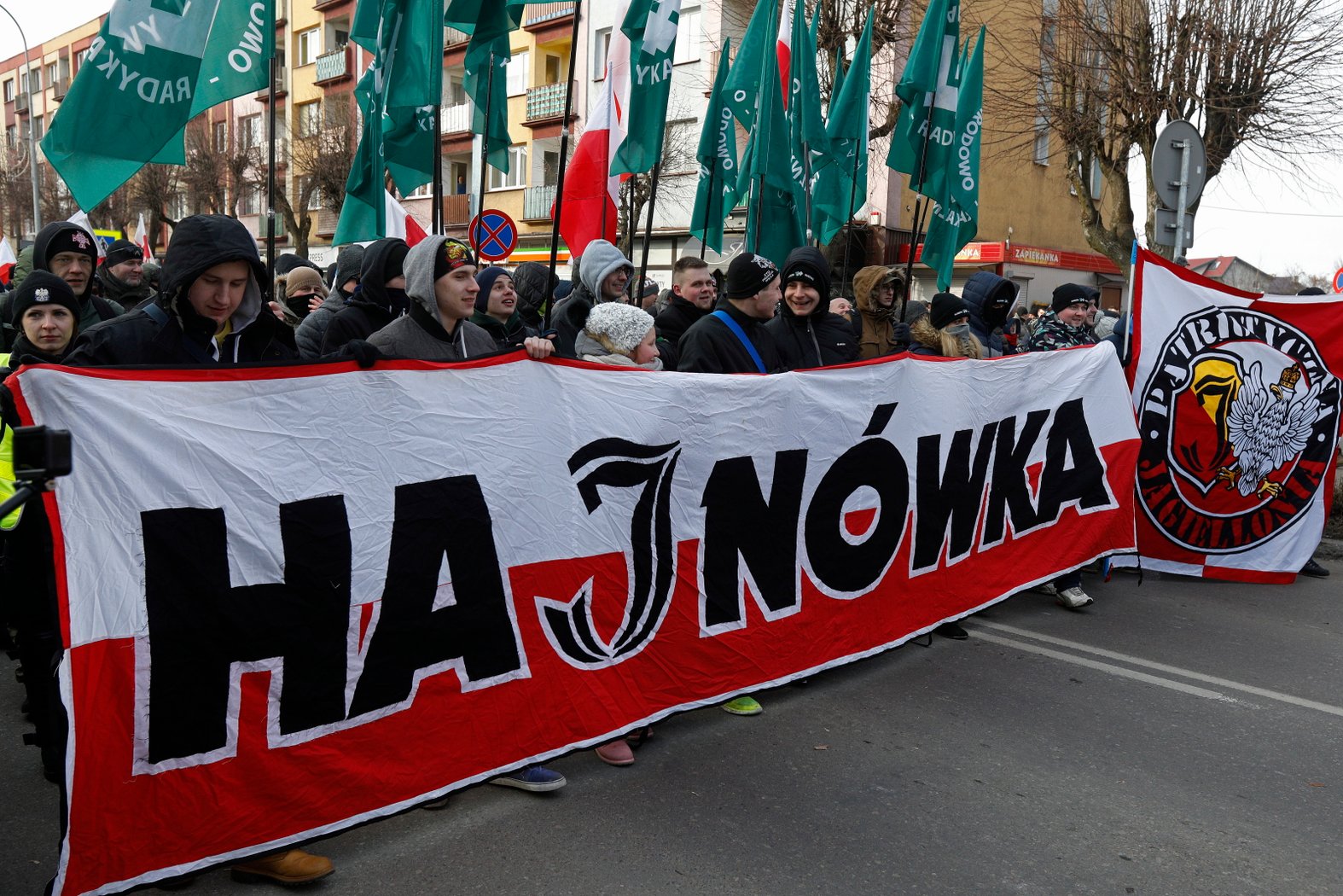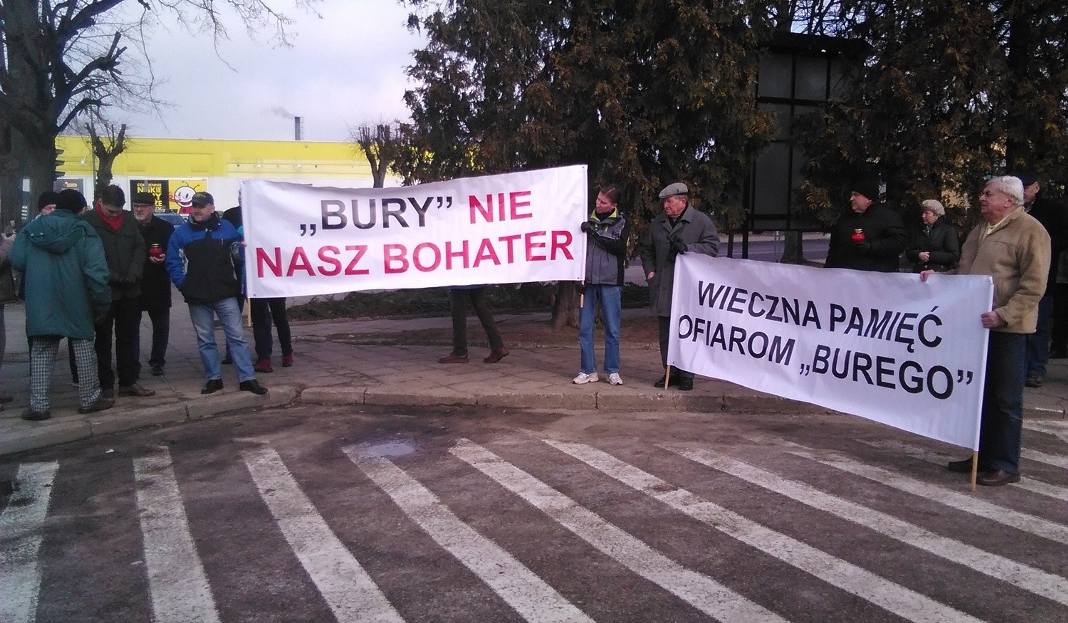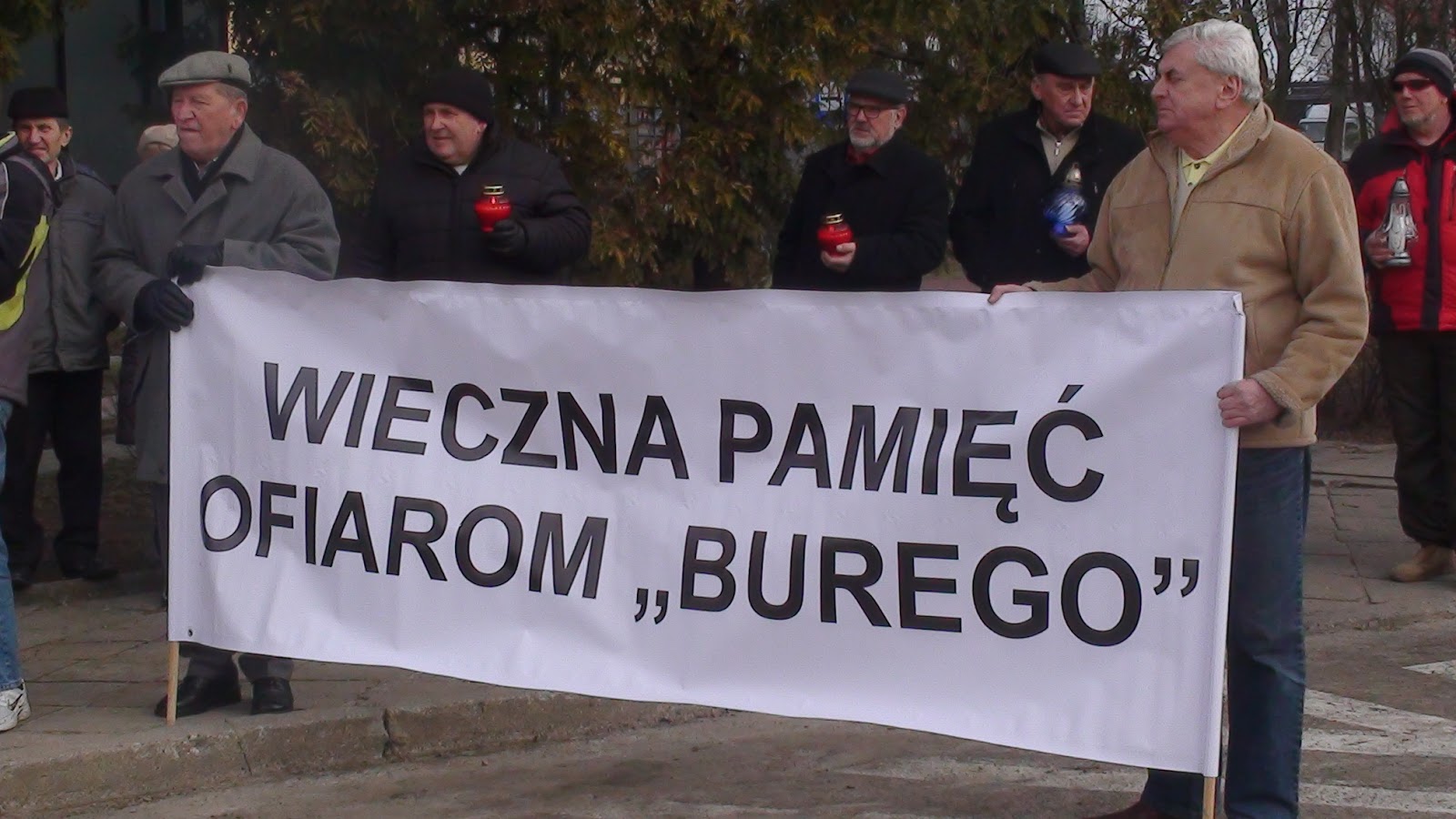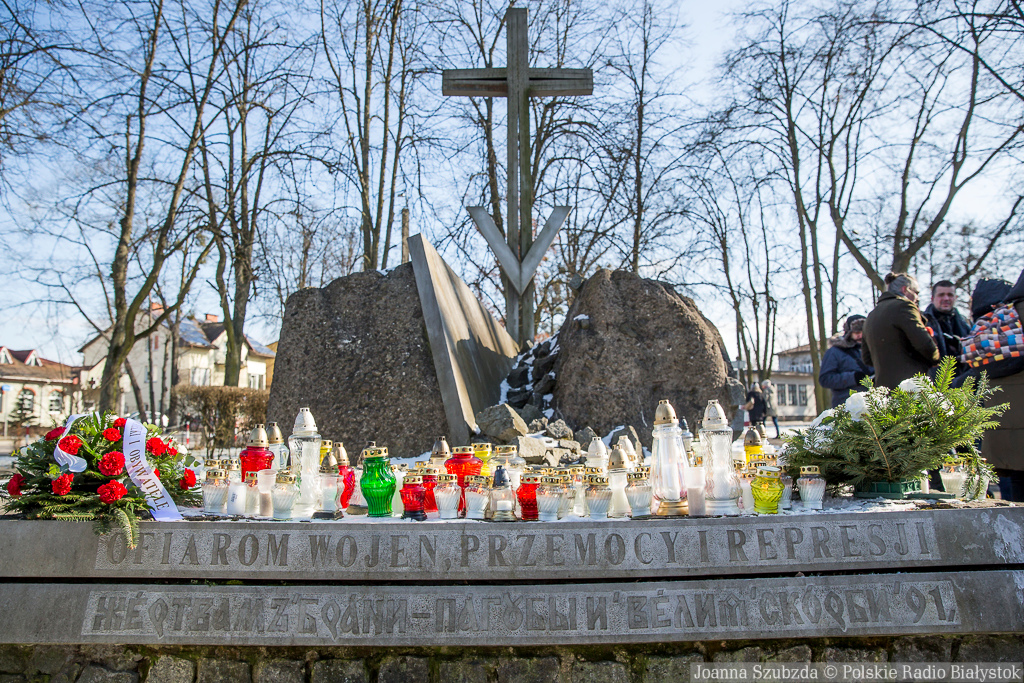|
|
Post by Bonobo on Apr 23, 2017 15:04:26 GMT 1
Some murals cause cause controversy: Vandal attacks Polish 'Cursed Soldiers' mural 16.04.2017 16:14 The word “murderer” has been painted onto part of a Gdańsk mural depicting one of Poland's “Cursed Soldiers”, major Zygmunt Szendzielarz, also known as Łupaszko. Part of Gdańsk's mural to "Cursed Soldiers". Photo: PAP/Adam Warżawa.Part of Gdańsk's mural to "Cursed Soldiers". Photo: PAP/Adam Warżawa.  Local police are investigating the vandalism. The 160-metre long mural, which was commissioned by Poland's Institute of National Remembrance and completed less than a year ago, commemorates Szendzielarz and a number of other so-called “Cursed Soldiers” who fought against the imposition of communism in Poland. Poland's official underground army (AK) was disbanded in January 1945, but thousands of Poles continued to fight in other formations, as the Red Army extended its grip across the country. Szendzielarz was arrested in 1948, transported to Warsaw and imprisoned by the communist authorities. He was interrogated about 50 times. In a show trial, he was sentenced to death, and executed in February 1951. |
|
|
|
Post by pjotr on May 28, 2017 22:19:13 GMT 1
Some murals cause cause controversy: Vandal attacks Polish 'Cursed Soldiers' mural 16.04.2017 16:14 The word “murderer” has been painted onto part of a Gdańsk mural depicting one of Poland's “Cursed Soldiers”, major Zygmunt Szendzielarz, also known as Łupaszko. Part of Gdańsk's mural to "Cursed Soldiers". Photo: PAP/Adam Warżawa.Part of Gdańsk's mural to "Cursed Soldiers". Photo: PAP/Adam Warżawa.  Local police are investigating the vandalism. The 160-metre long mural, which was commissioned by Poland's Institute of National Remembrance and completed less than a year ago, commemorates Szendzielarz and a number of other so-called “Cursed Soldiers” who fought against the imposition of communism in Poland. Poland's official underground army (AK) was disbanded in January 1945, but thousands of Poles continued to fight in other formations, as the Red Army extended its grip across the country. Szendzielarz was arrested in 1948, transported to Warsaw and imprisoned by the communist authorities. He was interrogated about 50 times. In a show trial, he was sentenced to death, and executed in February 1951. Probably Polish communists (Marxist-Leninists) did this. I saw extreme left graffiti in Warsaw on walls too. A militant radical marxist group painted Hammer and sickles with guns on walls, symbolising far left armed struggle.  I saw this image on Warsaw walls in August 2006 in the city center. Looked like some fringe far left group symbol I saw this image on Warsaw walls in August 2006 in the city center. Looked like some fringe far left group symbol |
|
|
|
Post by Bonobo on May 28, 2017 22:23:14 GMT 1
Probably Polish communists (Marxist-Leninists) did this. I saw extreme left graffiti in Warsaw on walls too. A militant radical marxist group painted Hammer and sickles with guns on walls, symbolising far left armed struggle. Hard to say. Some cursed soldiers acted like bandits, you know that war corrupts people. It might have been a communist but also a descendant of a person accidentally/purposefully murdered by the anti-communist underground. en.wikipedia.org/wiki/Dubingiai_massacre |
|
|
|
Post by pjotr on May 28, 2017 22:31:09 GMT 1
Probably Polish communists (Marxist-Leninists) did this. I saw extreme left graffiti in Warsaw on walls too. A militant radical marxist group painted Hammer and sickles with guns on walls, symbolising far left armed struggle. Not necesarily. Some cursed soldiers were regular bandits, you know that war corrupts people. Dear Bonobo, Maybe you are right. You will know more about the subject than I do. I have less knowledge and less access to Polish historic date than you do. I wonder though who were greater (political) bandits, the legal Polish secret service, Milicja and UB/SB chaps or these anti-communist AK resistance fighters who continued to combat the Polish Stalinist regime. War corrupted people everywhere, and unfortunately some war crimes, crime against humanity and corruption, nepotism and neglectance of restance fighters during the war are a taboo subject in post war days and sometimes even today in the west. There was not absolute good vs evil, there were wrong elements on both sides. With both sides I mean: One side the Nazi and Stalinist totalitarians and on the other side the resistance (Partisan) movements. Cheers, Pieter |
|
|
|
Post by pjotr on May 28, 2017 22:50:38 GMT 1
Dear Bo, The Dubingiai massacre, Glinciszki massacre of Polish citizens by Lithuanian Nazi collaborators (the Dubingiai massacre was a reprisal for the Glinciszki massacre), Lidice in Czechia, the Oradour-sur-Glane massacre in France, the Malmedy massacre in Belgium, Babi Yar, Jedwabne, Kielce, the Ostrówki massacre in Volhynia of Polish citizens, the Putten raid in the Netherlands ( en.wikipedia.org/wiki/Putten_raid ) were brutal as well. From all sides there were massacres, violations of human rights and thus war crimes in that vicious, mean and brutal war.The most brutal war in the European history. I don't pardon the AK, but these Lithuanian SS participated in the Holocaust in Lithuania and Poland. The Dubingiai massacre was wrong and should be condemned, but these Lithuanian Nazi collaborators were wrong too. They slaughtered jews, Poles and others. Cheers, Pieter |
|
|
|
Post by Bonobo on May 28, 2017 23:12:36 GMT 1
Dear Bo, The Dubingiai massacre, Glinciszki massacre of Polish citizens by Lithuanian Nazi collaborators (the Dubingiai massacre was a reprisal for the Glinciszki massacre), Lidice in Czechia, the Oradour-sur-Glane massacre in France, the Malmedy massacre in Belgium, Babi Yar, Jedwabne, Kielce, the Ostrówki massacre in Volhynia of Polish citizens, the Putten raid in the Netherlands ( en.wikipedia.org/wiki/Putten_raid ) were brutal as well. From all sides there were massacres, violations of human rights and thus war crimes in that vicious, mean and brutal war.The most brutal war in the European history. I don't pardon the AK, but these Lithuanian SS participated in the Holocaust in Lithuania and Poland. The Dubingiai massacre was wrong and should be condemned, but these Lithuanian Nazi collaborators were wrong too. They slaughtered jews, Poles and others. Cheers, Pieter Yes, Peter, Lithuanian units eagerly supported Germans carrying out Holocaust in Lithuania. But let`s be fair - some cursed soldiers in Poland also killed Jews, even after the war. www.sztetl.org.pl/en/article/kroscienko-nad-dunajcem/13,sites-of-martyrdom/15707,the-vicinity-of-kroscienko-on-danube-a-site-of-an-execution-1946/ |
|
|
|
Post by Bonobo on Mar 23, 2018 23:36:48 GMT 1
The residents of the town of Hajnówka oppose nationalists who demonstrate there every year to commemorate an anticommunist commander and his cursed soldiers. Apart from fighting Soviet communists and their helpers in years after WW2, they also attacked a Belarusian village and killed a few dozen people, including children. The event is still remembered today by orthodox Belarusian minority in Poland.
Unfortunately, this year’s Forgiveness Sunday in the Polish town of Hajnówka in the Podlasie Province was a restless one. For the first time in the history of the famous Holy Trinity Cathedral, the Rite of Forgiveness had to be served immediately after the morning Liturgy rather than in the evening due to a scheduled Polish nationalist march which was to pass under the walls of the cathedral, reports Sobor.by.
The town of Hajnówka is the center of Poland’s Belarusian minority, with the majority of them being Orthodox. The march scheduled that day was in fact to glorify an infamous killer of the Belarusian people of Podlasie, the Polish underground fighter Romuald Rajs, known as “Brown.” In the winter of 1946, Rajs’ group burned Podlasie together with its inhabitants, including the women and children of several Belarusian villages. Three dozen Orthodox peasants were also shot by “Brown’s” order.
Rallies, marches, and other events in honor of Rajs and his “cursed soldiers,” as they are known, are being held this week in Poland, as March 1 is the official commemoration date for these bandits who fought against the People’s Commissariat for Internal Affairs and the post-war authorities.
“Our community is shocked that at this time, on Forgiveness Sunday before the beginning of Great Lent, a march for the ‘cursed soldiers’ has been organized. We’re not against the ‘cursed soldiers,’ but if the banners in this march bear his face and the symbol of the Institute of National Remembrance which in 2005 officially considered his actions as bearing the signs of genocide, it is the usual provocation,” stated Lyutsina Rushuk, representative of the Hajnówka Division of the Cyril and Methodius Brotherhood of Poland.
The majority of Hajnówka Catholics did not support the actions of the Polish nationalists, and several prominent figures came to support the Orthodox whose ancestors had died at “Brown’s” hands.
“First of all, I would like to express my solidarity with the Belarusians of Hajnówka, and with the Orthodox community of Hajnówka against this act of hatred, xenophobia and nationalism being carried out today in the form of a march in honor of the memory of this criminal, who killed Orthodox Belarusians in the tragic time of the Second World War. At such a time it is necessary to be with the people of Hajnówka and express our solidarity,” said Robert Tyszkiewicz, member of Polish Parliament.
The Belarusian Orthodox simply wanted to peacefully pray on Forgiveness Sunday, while what occurred is being considered basically a violation of the constitution right to worship. The route the organizers chose is not random, Tyszkiewicz explains. Last year one of the marchers was photographed with a smile on his face on the ashes of the homes of one of “Brown’s” victims. “This is not accidental. This is a vile, disgusting act, full of hatred, aimed at intimidating and dividing the people,” he concluded.theorthodoxchurch.info/blog/news/polish-nationalists-stage-provocative-march-on-forgiveness-sunday-in-hajnowka/     |
|
|
|
Post by Bonobo on May 3, 2018 17:18:55 GMT 1
Various monuments of cursed soldiers are regularly attacked. The latest one in Krakow - Łupaszka again:  |
|
|
|
Post by Bonobo on Jul 13, 2018 17:08:29 GMT 1
Also, Poland`s neighbours don`t revere cursed soldiers too much. From Ukrainian site euromaidanpress.com/2016/07/30/poland-starts-honoring-war-criminals-of-1940s/
Poland starts honoring war criminals of 1940s
Poster of the information campaign "2013 - year of the Cursed Soldiers". Some some structures of this military department (over ten) were poorly coordinated – outright criminals were in their ranks as well.
2016/07/30 - 03:57 • Analysis & Opinion, History
Members of Polish Sejm are outraged: unlike Ukraine, rebels with blood of civilians on their hands aren’t glorified in Poland. The deputies mean the Ukrainian Insurgent Army (UPA), which is responsible for killing Poles in Volyn. Indeed, in Poland, the soldiers that killed Ukrainians are barely commemorated. However, Warsaw has started creating a cult of war criminals which on top of fighting the communists were killing civilian Belarusians, Lithuanians, and Slovaks, Igor Isajev writes at texty.org.ua portal.
When politicians of the Polish ruling party Prawo i Sprawiedliwość (PiS) responded to the letter of Ukrainian intellectuals on the Volyn tragedy, they sententiously emphasized: “In Poland, we don’t honor the memory of people who have blood of civilians on their hands.” However, that’s not exactly the truth. Poland commemorates such people, and politicians of PiS do it with even more pomp than their predecessors.
“Cursed soldiers”
This term (żołnierze wyklęci) entered Polish parliamentary discourse at the beginning of the XXI century. In general, it stands for the Polish “forest brothers” which kept fighting the communists on the territory of Poland after the dismissal of the Home Army (Armia Krajowa, AK) in January 1945. This resistance lasted until around the 1950s, though, unlike the AK, some structures (over ten) were poorly coordinated – outright criminals were in their ranks as well.
From 2011 onwards, the 1st of March is a celebrated as a state holiday in Poland dedicated to the memory of warriors of the military anti-communist underground – it is the National Memory Day of the “cursed soldiers.” On this day in 1951, communists executed the death sentence against the leaders of one of the underground associations.
On the same day but in 1945, soldiers of the functioning AK department started massacring civilians in the Ukrainian village Pavlokoma – later this village became a symbol of martyrdom of Ukrainians in Poland. Here lays the danger of the cult of “cursed soldiers” – whilst for Central Poland they were fighters against communists, on its outskirts they became the embodiment of criminality.
Unfortunately, at that time the front of the struggle determined not only the political but also the national question. Here are a few examples of how Polish authorities honor heroes and criminals at the same time these days.
Zygmunt Szendzielarz — “Lupaszka”
This is the most well-known personality of the “cursed soldiers.” He was born in Stryi which is currently Ukrainian, but his activities were connected to the Vilnius region where structures of the Polish underground were strong.
Besides fighting against Soviet saboteurs, he was also known for crimes against Belarusians and Lithuanians. In 1944, his department killed Lithuanian defenders and civilians in the village of Dubingiai, not far from Vilnius.
In June 1948, “Lupaszka” was arrested by the members of Polish security service. Right after the arrest he was transported to Warsaw and imprisoned, where he stayed till February 1951. His remains were found a while ago.
This year, Polish authorities decided to rebury him at the highest level and give him the rank of colonel post mortem. On 22 April, a requiem was held in the Lodz Cathedral, in which Poland’s defense minister took part. “Taking leave of colonel Szendzielarz, we are saluting the independent Poland, which could’ve been gone by now,” the minister said during the ceremony.
Official ceremony commemorating Zygmunt Szendzielarz who, besides fighting Soviet saboteurs, killed civilians of the Lithuanian village. Photo: polskieradio.pl
Official ceremony commemorating Zygmunt Szendzielarz who, besides fighting Soviet saboteurs, killed civilians of the Lithuanian village. Photo: polskieradio.pl
On 24 April, a ceremony of reburial of Zygmunt Szendzielarz took place in Warsaw. President Andrzej Duda took part in it. “Today the dignity of proud Poland comes back… Poland that bows its head and pays tribute to its great son,” Duda said.
Romuald Rajs — «Bury»
Another person connected to the Polish movement of resistance in outskirts of Vilnius, though this time he is accused by the Orthodox peoples of Podlasye. After actions in outskirts of Vilnius Bury moved to Podlasye, Hajnowka.
The department headed by Bury was responsible for the death of Orthodox civilians of the villages of Zaleshany, Koncovizna, Shpaky. In the village of Stari Puhaly Bury, he shot three dozens of Belarus village residents who refused to be listed as Catholics. The ones that agreed survived.
This year, on 27 February, local Polish nationalists organized the march of “cursed soldiers” in Hajnovka carrying the photo of Bury. They announced about honorary patronage of president Andrzej Duda. Information about it even appeared on the official web-site of the head of the state, though disappeared quickly after the media reaction.
“In connection with the messages in the media about alleged patronage of the Polish President over the 1st Hajnovka March of the ‘cursed soldiers’ we would like to announce that the president didn’t patronage these events,” the official statement of the Office of the President from 15 February stated.
Romuald Rajs killed three dozens of Belarusian civilians because they refused to convert from Orthodoxy to Catholicism. President Andrzej Duda was about to honor his memory. Photo: wyborcza.pl
Romuald Rajs killed three dozens of Belarusian civilians because they refused to convert from Orthodoxy to Catholicism. President Andrzej Duda was about to honor his memory. Photo: wyborcza.pl
Jozef Kuras – “Ogien”
He is one of the leaders of the anti-communist movement on Podhale in Southern Poland, where the Slovak community lives. According to the Union of Slovaks in Poland, he robbed and killed the local Slovak population. According to other sources, he shot over a dozen of local Jews.
Despite this, in 2006, the monument to Ogien in the town of Zakopane was personally opened by then-president of Poland Lech Kaczynski. “In order to restore memory, I decided to be here today… Ogien is a hero worthy of honor, though we also know that today his figure sparks controversies. Exactly this is the reason why I interrupted my vacation and came here,” he said then.
Ex-president of Poland Lech Kaczynski kneels before the monument to Jozef Kuras.
Ex-president of Poland Lech Kaczynski kneels before the monument to Jozef Kuras. Union of Slovaks in Poland believes that he killed and robbed civillian Slovaks. Photo: wp.pl
Mieczyslaw Pazderki – “Szary”
On 6 June 1945, Mieczyslaw Pazderski’s department killed almost two hundreds of civilians in the Ukrainian village of Verkhovyny. Two days later, the outnumbered department was attacked by the Red Army; Szary himself died near the village of Huty. That was one of the biggest fights of the Polish anti-communist underground against the communists.
The Polish President awarded Mieczyslaw Pazderski with the Cross of National Military Rank and Partisan Cross… back in 1992. Celebrations take place in eastern Poland, but only local authorities participate.
The latter story is an exception. I talked to a couple of historians and representatives of Ukrainian minority in Poland: none of them recalled state officials honoring Polish soldiers that had killed Ukrainians.
This means that the words of Polish deputies about Poland not honoring people with the blood of civilians on their hands, unlike Ukraine (meaning the UPA), should be amended to add that it’s specifically Ukrainian civilians.
The criminal side of the heroes
Yet, on the territory of the former Polish-Ukrainian conflict, in particular in Przemysl, we can see many events dedicated to Bury and Ogien. Even though for a part of citizens they are undoubtebly heroes, many statements that these people are criminals exist in the public disourse in Poland.
Why does the criminal side of these people fade into the background? First of all, because in the Polish anti-communist underground there were no national-scale criminals, the way as the Ukrainian UPA leader Stepan Bandera is perceived as a great „black hero” for Warsaw.
Secondly, the memory of the “cursed soldiers” is important as a collective example of betrayal for the current Polish authorities. The Polish communists betrayed the “cursed soldiers” when they chased them. They were also betrayed by the Polish government in exile in London, which recommended them to lay down arms. “Betrayed” and “cursed” by everyone, they kept on fighting.
They fought for the “true Poland” – and as politicians of PiS suggest, their predecessors gave up on its ideals not only in the 1940s, but also in the 2010s.
That’s why the memory about these figures is also a part of Polish internal political debate. Not all Poles enjoyed events commemorating Lupaszka or Bury at the highest level. Public pressure, in particular from the PiS supporters, was most likely the reason that the President didn’t patron the events in Hajnowka. |
|
|
|
Post by Bonobo on Mar 2, 2019 19:06:45 GMT 1
The Day of Cursed Soldiers - brawls again
Around 300 far right activists marched in the eastern Polish town of Hajnowka on Saturday (February 23) to commemorate the 'Cursed Soldiers', a group of militants revered as patriots by some and seen as murderers by others. Adam Andruszkiewicz denies accusations on falsifying signatures for local elections The investigation... czytaj dalej » Due to their resistance at the end of World War Two, the Cursed Soldiers are seen as a model of patriotism for nationalist groups as well as by Poland's ruling conservative Law and Justice Party. But Romuald Rajs, one of the leaders of the group known under his nom de guerre of 'Bury', was sentenced to death for killing some 80 villagers of Belorussian origin in villages near Hajnowka. A counter-protest was also held in Hajnowka on Saturday, attended by the town's mayor who tried to have the annual march cancelled but was overruled by a court challenge. In the nearby hamlet of Zaleszany, gravestones mark the burial sites of those killed in the 1946 massacre, including women and children. (http://www.tvn24.pl)www.tvn24.pl/tvn24-news-in-english,157,m/some-300-far-right-activists-marched-to-commemorate-cursed-soldiers,912894.html |
|
|
|
Post by Bonobo on Mar 24, 2019 17:23:10 GMT 1
Some cursed soldiers are also denunciated in other countries.
Minsk Summons Polish Ambassador Over Revision Of War Crimes Against Belarusians -Statement
Zeeshan Aziz (@imziishan) 12 days ago Tue 12th March 2019 | 10:11 PM
Minsk Summons Polish Ambassador Over Revision of War Crimes Against Belarusians -Statement
Polish ambassador in Minsk, Artur Michalski, was summoned to the Belarusian Foreign Ministry on Tuesday to explain a recent decision of Polish authorities to acquit Polish anti-Communist insurgent Romuald Rajs of war crimes against the Belarusians, Belarusian Foreign Ministry spokesman Anatoly Glaz said
MINSK (UrduPoint News / Sputnik - 12th March, 2019) Polish ambassador in Minsk, Artur Michalski, was summoned to the Belarusian Foreign Ministry on Tuesday to explain a recent decision of Polish authorities to acquit Polish anti-Communist insurgent Romuald Rajs of war crimes against the Belarusians, Belarusian Foreign Ministry spokesman Anatoly Glaz said.
Romuald Rajs, also known under the nickname "Bury," was sentenced to death in 1949, charged, in particular, with the mass killing of Polish Belarusians. On Monday, Poland's Institute of National Remembrance (IPN) published a statement revising the actions of Rajs and saying that the institute's earlier conclusions on the case were faulty.
"We expect official comments from the Polish authorities on whether this assessment of Bury's actions is [Poland's] official position and how it agrees with the steps to build dialogue, including the historic one, that both sides have recently taken. The Polish ambassador has been summoned to the Foreign Ministry to give relevant explanations," Glaz said in a statement.
The IPN said Rajs "did not intend to destroy the Belarusian community living in Poland within its present borders." According to the institute, he was guilty of "creating the situation he could not cope with and as a result of which ... the people, who under no circumstances should have suffered, were killed."www.urdupoint.com/en/world/minsk-summons-polish-ambassador-over-revision-569452.html |
|